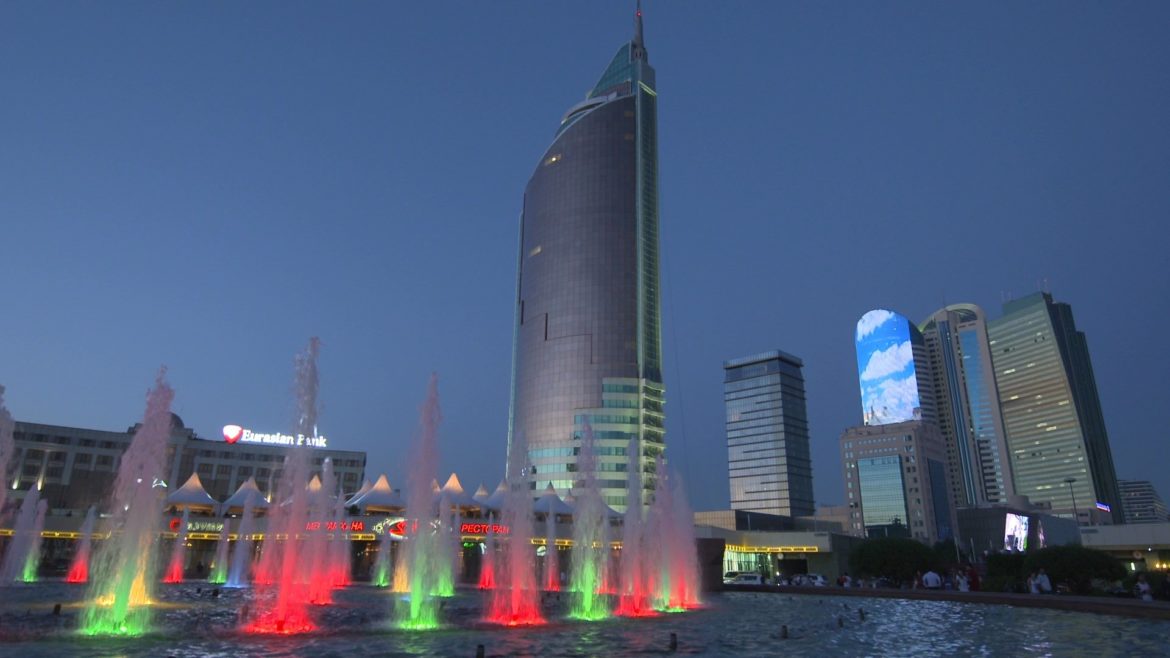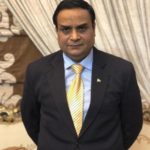
Dr. Mehmood Ul Hassan Khan has specialties in management, marketing, economics and governance. He has also master degree in Development with specialization in Diplomacy and Public Relations. He has also a rich experience in research, peace and conflict resolution and defence issues. His research and comprehensive articles have already been published in China, Uzbekistan, Iran, Turkey, Azerbaijan, USA, South Korea, UAE and Kuwait too.
He has great experience in the socio-economic, geo-politics and geo-strategic issues of Central Asia, Caucasus and Middle East. He is a famous expert on CIS and Caucasus in Pakistan. Member Board of Experts: CGSS, Islamabad. Ambassador at large at IHRFW.
The “Geneva of Asia”, Republic of Kazakhstan has a pragmatic, forward looking and progressive foreign policy which emphasizes to foster strong, sustainable alliances, meaningful partnerships, and trustworthy friendships based on mutual respect. Due to its visionary leadership it has many foreign policies and diplomatic accomplishments during the last thirty years.
Kazakhstan seems a kind of positive/soft state having rich natural resources, the world’s ninth largest country by area, and located in the very geographical center of Eurasia.
It does not have favourable geopolitical conditions and moreover its own position at the junction of the interests of global players, yet it confidently maintains domestic political stability, sustainable economic growth and constructive relations with all the main actors of the global power politics.
Figure-I
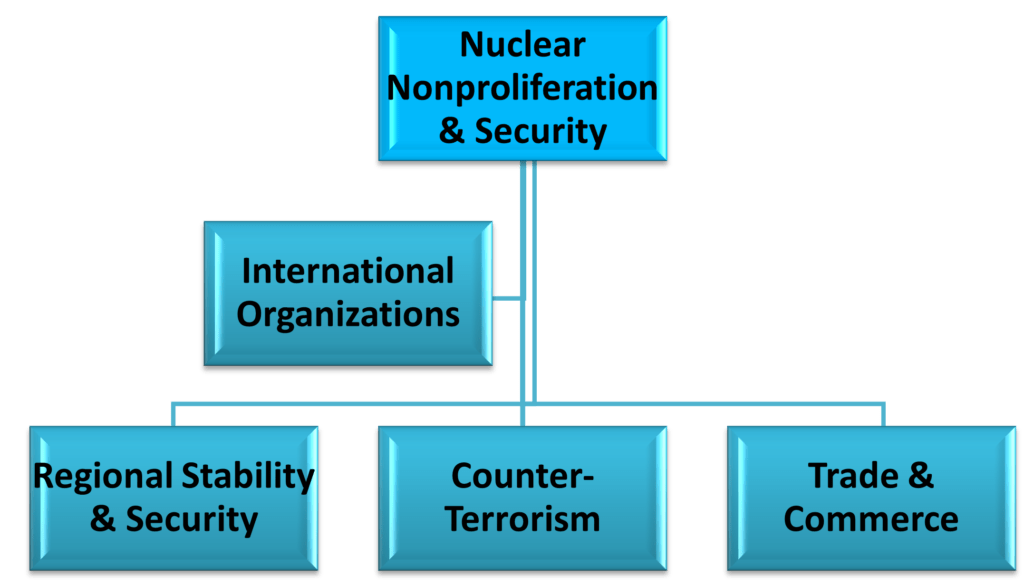
Kazakhstan, shares one of the longest land borders with two world powers, Russia and China, manages to successfully maneuver in the dark waters of world politics.
According to Kazakhstan’s official statistics (2019-2020) China second-largest trading partner of it. In this connection, bilateral trade reached $11 billion in 2018. China is also a major investor in Kazakhstan through its Belt and Road Initiative (BRI). Kazakhstan’s Khorgos Gateway, the biggest dry port in the world, was constructed by Chinese companies.
Kazakhstan has also maintained cordial bilateral relations with Russia since its inception. According to Kazakhstan’s official statistics (2019-2020) Russia is its largest trading partner, with an estimated $18 billion in 2018. President Kassym-Jomart Tokayev has very trustworthy relations with President Vladimir Putin.
In this context, security agreements provide a stable base for the Russian-Kazakh relationship as well as Kazakhstan’s membership to the Moscow-led Eurasian Economic Union. In January 2019, the two governments ratified a deal under which Kazakhstan will assemble Russian military helicopters. That same year, Kazakh troops participated in the Russian-led multinational exercise center 2019. But it has rejected Moscow’s offer to build a nuclear power plant in its territory which showed its independent foreign policy.
Since its independence, Kazakhstan has been a successful model of political stability, consistence democratization, social cohesion, and people’s friendly legislation and structural reforms which is based on the foreign policy strategy of H.E. Nursultan Nazarbayev, the First President of the country.
Nazarbayev, like Lee Kuan Yew in Singapore, is the real de facto architect of modern Kazakhstan. H.E. Kassym-Jomart Tokayev, Nazarbayev’s successor and the former Deputy Secretary General of the United Nations, succeeded in the presidential elections of 2019, and continued and consolidated uniqueness of its foreign policy and followed the line of his predecessor.
Kazakhstan’s foreign policy does not envision itself as a pawn on some Eurasian chessboard, but rather as an independent power with its own objectives and ambitions. Moreover, Kazakhstan is looking to increase its image and influence, in Central Asia and beyond.
The Republic of Kazakhstan managed risks of foreign policy through the balanced development orientations of external relations in all strategic areas. It followed a “multi-vector” principle, which remained doctrinal significance for Kazakhstani diplomacy.
It distinguishes Kazakhstan from other Central Asian Countries which has an ideal combination of consistency and flexibility in the implementation of this principle and it remained strong, stable and sustainable in all its important parameters of national sovereignty, territorial integrity, politicization and democratization, socio-economic prosperity, effective good governance and last but not least, human survival and productive channels.
It has been a reasonable pragmatism and the rational decision making “not to put all eggs in one basket” which created strategic cushion to move forward in a peaceful manners. In this context, Kazakhstan has been applying the “multi-vector” model to almost all spheres of its international cooperation, engagements and dialogues since its inception.
Kazakhstan protected all its vested interest of security through innovative diplomatic maneuvering and economic manipulation since 1991 and successfully surpassed all regional as well as international crises. Formation of the Shanghai Cooperation Organization (SCO) was a deliberate strategic move to achieve element of diplomatic diversity and further sustainability among the regional main stakeholders. It has actually enhanced its regional connectivity and Out-Reach Policy (ORP) of South Asian Region.
Figure-II
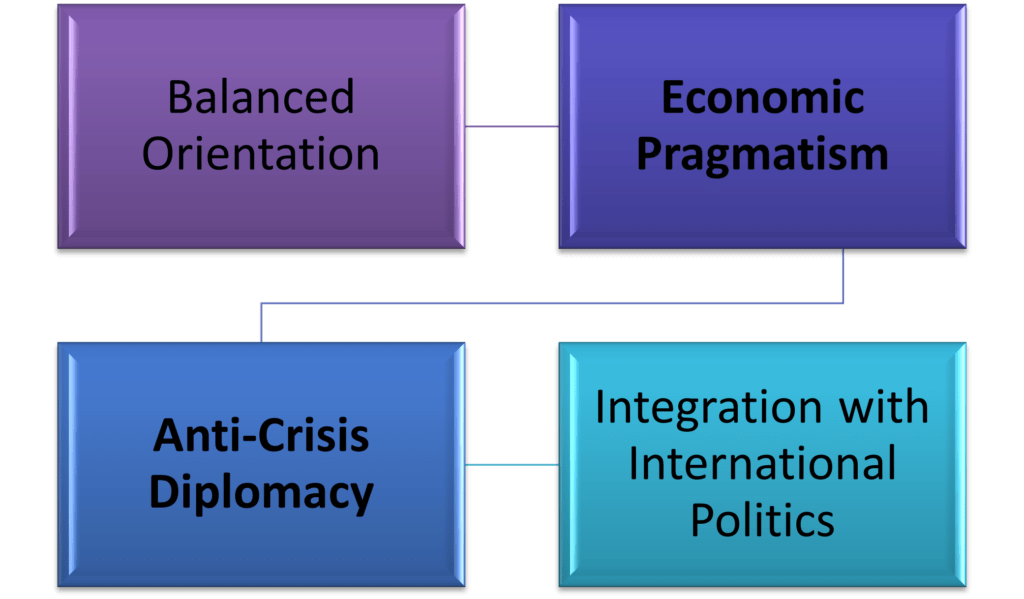
Kazakhstan also followed Balancing Act Doctrine and has been an active participant in the NATO Partnership for Peace program, and maintains close cooperation with the United States, which, despite some kind of displeasure and discomfort in Moscow and Beijing, plays an important stabilizing role in the region from the point of view of Kazakhstan’s vested interests.
Kazakhstan has also friendly ties with USA. The U.S. former President Donald Trump and former Kazakhstan President Nazarbayev met in January 2018, a high-level meeting which was followed by another in September 2019 in New York between Presidents Trump and Tokayev. Regular official contacts with senior U.S. officials also occur through the C5+1 group comprised of the five Central Asian states and the U.S.
According to Kazakhstan’s official statistics (2019-2020) bilateral trade between Washington and Nur-Sultan reached $2.1 billion in 2018. This marked a new milestone in bilateral trade, which has generally increased in recent years; traffic of goods and services reached $1.3 billion in 2017.
Right from the beginning, Kazakhstan sought to expand the orbit of its interests, intentionally associating itself with a broader international agenda. In this connection, Kazakhstan initiated the idea of Conference on Interaction and Confidence-Building measures in Asia (CICA) the only international platform providing a stable dialogue on security issues in Asia as a whole. It enabled to identify its presence in European Union (EU) through the chairmanship of the OSCE in 2010 which further enhanced its pivotal role in the European security architecture especially energy security.
Kazakhstan and the European Union (EU) have signed a new trade agreement, the Enhanced Partnership and Cooperation Agreement (EPCA), which entered into force on March 1, 2020. According to the European Commission (2020) the EU is Kazakhstan’s biggest trade partner as a bloc, with almost 40 percent share in its total external trade. The European Bank for Reconstruction and Development has invested in Kazakhstan’s energy industry by building solar power facilities.
Kazakhstan consistently adopted and implemented the principle of economic pragmatism, which remained the main criteria for all strategic decisions for the last thirty years. Economy first, then politics”, remained dominating factor during former president Nazarbayev and is still the role model of incumbent government. This approach was development oriented which promoted economic stability and ultimately achieved its sustainability.
It blocked political radicalism within the country, but also in the external arena, in relations with strategic partners. Nevertheless gradual political reforms have been initiated which also created befitting business equity and political tranquility in the country.
Kazakhstan’s engagement with the Eurasian Economic Union (EAEU), invariably emphasizes the purely economic nature of this organization. Thus Nazarbayev’s principled position in favor of economic pragmatism blocked all attempts to politicize the union.
Kazakhstan’s inclusion in the Turkic Council is another prime example of its economic and commercial diplomacy which has actually further diversified its regional as well as international relations.
Kazakhstan has been performing status of facilitator and mediator for the last thirty years. It hosted a round of the negotiations over Iran’s nuclear program back in 2013, and has hosted over a dozen rounds of talks intended to find a solution for the conflict in Syria under the flagship of the “Astana Peace Process (APP)”.
Moreover, its successful diplomatic efforts to reconcile Putin with Erdogan in 2016 became possible in particular because of special relations with Turkey which successfully averted an imminent diplomatic tussle and maintained peace in the region and beyond. Nazarbayev’s personal trusting relationship with both leaders played a special role which defused widening political and diplomatic rift between two countries. In this regard, Kazakhstan’s spirit of classical old diplomacy played a decisive role.
Interestingly, Kazakhstan followed anti-crisis diplomacy due to which Kazakhstan was able to avoid the risk of being drawn into contradictions between world powers.
In this connection, the Russian-Georgian conflict of August 2008 somehow created a difficult situation for the multi-vector policy of the country. Refusing to openly accuse the Kremlin at the start of the conflict, Nazarbayev, at the same time, was able to withstand the pressure from Moscow to recognize South Ossetia’s independence was a “master stroke” of its foreign policy. Afterward, Kazakhstan actively supported the resolution calling “for preserving the territorial integrity of states.” at the SCO summit.
Kazakhstan’s peaceful persuasion of diversification energy policy in terms of supplies and production should be treated as a significant “balancing” step to begin exporting oil to the West through the Baku-Tbilisi-Ceyhan oil pipeline which was aimed at partially reducing the dependence on the transport and communication systems of Russia.
Right from the beginning, Kazakhstani has been staunch supporter of conflict resolution and always seeks to independently create favorable external conditions.
Kazakhstan striving hard spirits developed spirits of rational decision making which secured its strategic interest and developed economic self-reliance and financial stability during the intensification in relations between the West and Russia, as well as deepening contradictions between the US and China, and resultantly it has created the Astana International Financial Center (AIFC). The establishment of AIFC has actually further enhanced inflows of FDIs, FPIs and joint ventures in the country and moreover, enabled it to enter in the Russian and Chinese financial markets.
Formation of the AIFC vividly reflects Kazakhstan’s ability to skillfully integrate itself into the dynamics of relations between different poles of power, effectively capitalizing its competitive advantages as a transit zone.
Kazakhstan has been following systematic efforts to integrate its foreign policy initiatives into the very center of international politics. Furthermore, this policy pursues a number of specific tasks, such as preventing a marginalization of Kazakhstan, as well as the inclusion of Central Asian region in the international arena.
Since its inception, Kazakhstan unilaterally rejected nuclear weapons arsenal. It is pertinent to mention that Kazakhstan possessed the 4th largest nuclear capability in the world, which was more than what China, the UK, and France had combined.
In this connection, its zero nuclear arsenal policy won the hearts and souls of all the regional as well as international power brokers. Voluntary rejection of Weapon of Mass Destruction (WMD) was the innovative move which has certain socio-economic, geopolitical and geostrategic dividends. It fostered its credibility in the West and among the international community in general.
Its rational thinking to abandon of nuclear potential has also secured numerous tangible dividends. Since 1991, Kazakhstan has attracted more than $300 billion of foreign direct investment, accounting for 75 percent of all investments in Central Asia as a whole.
Its visionary leadership created “Greater Eurasia” which was based on the unification of the Eurasian Economic Union, the Silk Road Economic Belt, and the European Union into a single mega-project. It was announced at the 70th session of the UN General Assembly in 2015.
The idea of Greater Eurasia (GE) triggered its regional connectivity and further consolidated its economic potential. It opened a new window of opportunity for all the regional players to form befitting propositions in terms of economy, trade and commerce, investments, and commercial diplomacy. Finally it promoted the principle of “inseparable of security”.
Kazakhstan has been following proactive politics is now the best way to stay afloat, which makes it possible not to become a passive hostage of a steadily escalating rivalry between major powers. It tried to promote spirits of harmony, peace and stability.
Its Astana club created a new format for meetings of political and business elites. It is a unique forum where the most influential representatives of the USA, Russia, China, Iran, Turkey, and 30 other, mainly Eurasian, countries gather at the same table to resolve issues.
According to its Foreign Ministry (2019) Kazakhstan has established relations with Barbados and with all Latin American and Caribbean nations which vividly reflected its diversified, dynamic and constructive foreign policy.
It hopes that in the near future, the “Asian Vienna (Kazakhstan) might be of considerable interest, because of its ability to resolve contradictions along the USA-Russia, USA-China, USA-Iran lines. The visionary leadership of Kazakhstan and its rich and diversified diplomatic and mediating experience may turn out to be very valuable assets.
Kazakhstan is a member of many influential international organizations. It is active member of the United Nations (UN), the Organization for Security and Cooperation in Europe (OSCE), the Organization of Islamic Cooperation (OIC), the Shanghai Cooperation Organization (SCO), the Conference on Interaction and Confidence Building Measures in Asia (CICA), the Commonwealth of Independent States (CIS), the Eurasian Economic Union (EAEU) and last but not least, the Collective Security Treaty Organization (CSTO).
Since 2003, it has been arranging the Congresses of Leaders of World and Traditional Religions in its country, aiming to unit at one table the leaders of all leading world religious confessions.
Kazakhstan also chaired the Group of Landlocked Developing Countries, a 32 member state initiative under the umbrella of the United Nations Conference on Trade and Development.
Furthermore, Kazakhstan remains the only Central Asian nation to have held a non-permanent seat in the United Nations Security Council (UNSC), for 2017-2018.
Kazakhstan took its participation in the UN to a new level when it deployed for the first time a company of 120 peacekeepers to the UN mission in Lebanon (UNIFIL) in October 2018 and a new contingent was sent in November 2019. No other Central Asian country has sent this amount of military personnel to UN peace missions.
Now President Tokayev has carried on the multi-vectored doctrine that First President Nursultan Nazarbayev implemented during his presidency. Both leaders believe that by enacting strong political and economic reforms, the country will be in a better position to build its relationships with other nations.
Kazakhstan is a neutral nation, which has worked hard to reform its military, political and economic policies as it advances toward a full democracy. The new concept of Kazakhstan’s foreign policy openly declares its intentions to secure the status of a “leading state” in the region.
On March 6, 2020, a presidential decree has approved the Republic of Kazakhstan’s Foreign Policy Concept for 2020-2030.
Figure-III
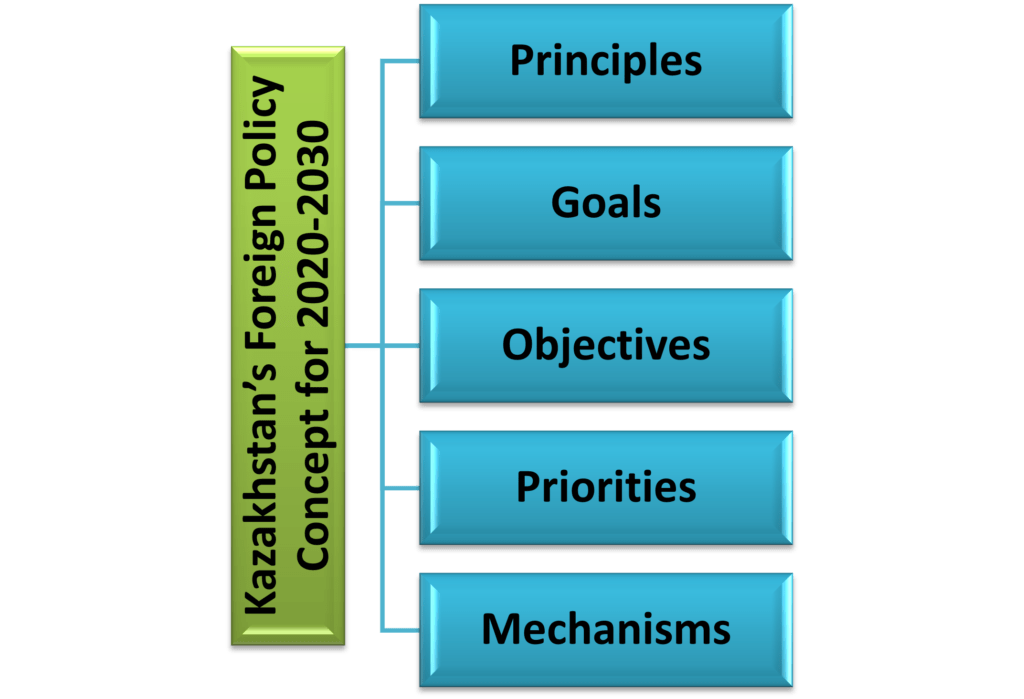
It highlights salient features of its system of fundamental views, i.e. the principles, goals, objectives, priorities, and mechanisms of the country’s foreign policy during the reference period.
In this context, Kazakhstan’s President Kassym-Zhomart Tokayev from the very beginning clearly emphasized the need to continue exercising the country’s endorsed political course, the foundations of which were laid by country’s first president Nursultan Nazarbayev.
It seems that the adoption of a new Foreign Policy Concept aimed at pursuing a multi-vector and well-balanced foreign policy. It is blue print for the new era. It is road map of further strengthening of bilateral relations and achieving of objectives of commercial diplomacy. It facilitates the associated main stakeholders to jointly work for the further development of the positive developments of Kazakhstan.
Figure-IV
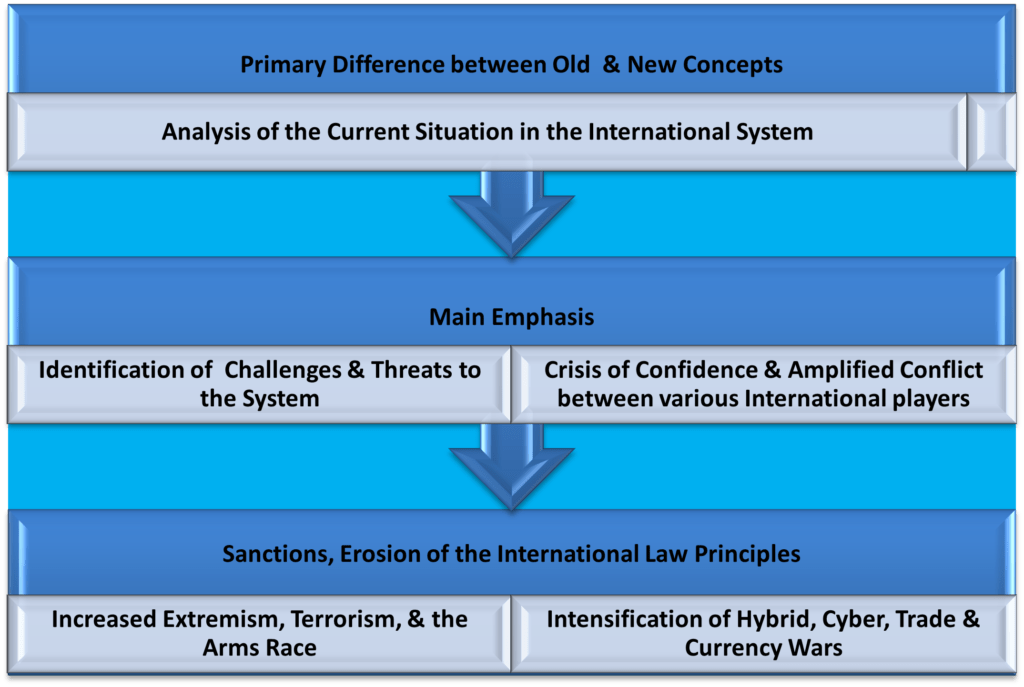
The new concept of foreign policy has some certain additions, variations and supplements which jointly shape its future recourse, formation of national narrative, development plans and above all specific priorities in diverse filed of economy, trade & commerce, investments, structural reforms, politicization and democratization, new social norms and devising of new comprehensive grand strategy to combat with all emerging state and non-state threats and crises.
It pinpoint strategic therapy to merging threats like climate change, conflict between various international actors, including sanctions, erosion of the international law principles, increased extremism, terrorism, and the arms race, the intensification of hybrid, cyber, trade and currency wars, among others.
It affirms Kazakhstan imperative and advantageous position of an active and responsible international community participant and contributor to ensuring international and regional stability and security. It emphasizes to maintain friendly, predictable and mutually beneficial relations with foreign partners.
It seems that Kazakhstan is interested to remain distant and neutral in contradictions and conflicts of world power brokers. Therefore, a multi-vector and pragmatic foreign policy permits Kazakhstan to build relations with other countries and international organizations as per its vested interests and on an equal and constructive basis.
Figure-V
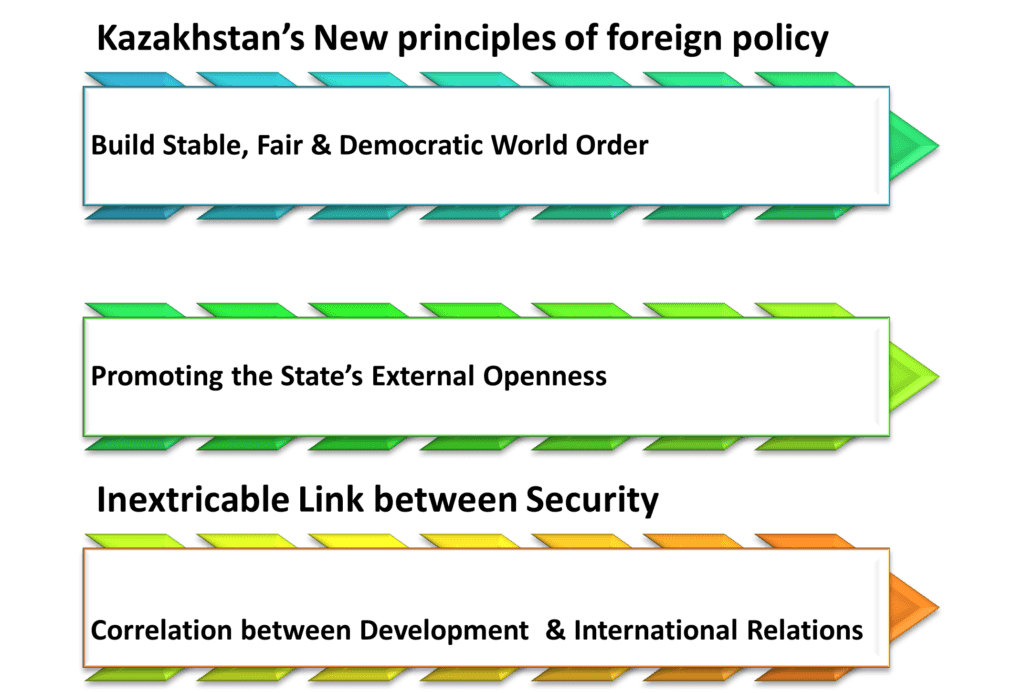
It chalks out new principles including helping build stable, fair and democratic world order, promoting the state’s external openness and the inextricable link between security and development in international relations. It urges an equitable integrative world to take care of global political, economic and humanitarian issues.
The new concept highlights the strategic importance of multiculturalism and aiming at establishing a collective vision and effective approaches for the international community to address a wide range of global and regional issues based on multilateral advisory and agreements.
Figure-VI
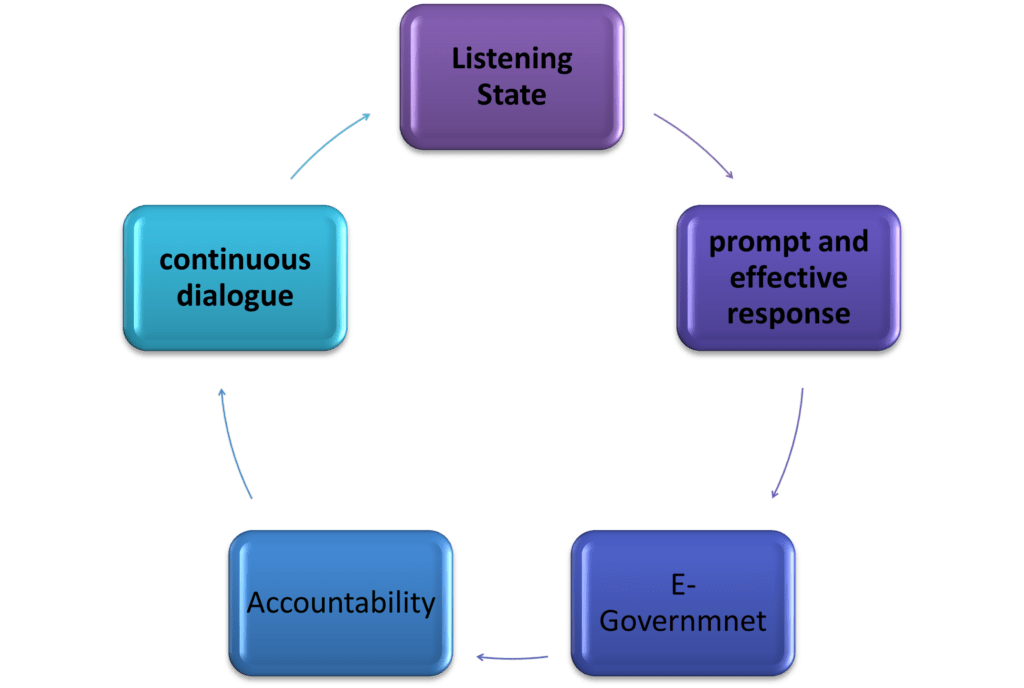
It further consolidates the concept of the “Listening State” proposed by President Kassym-Zhomart Tokayev in his first Message to the people of Kazakhstan. It refers to creating a qualitatively new mechanism for ensuring a continuous dialogue between state and society, whereas the former gives a prompt and effective response to the needs of citizens.
Figure-VII
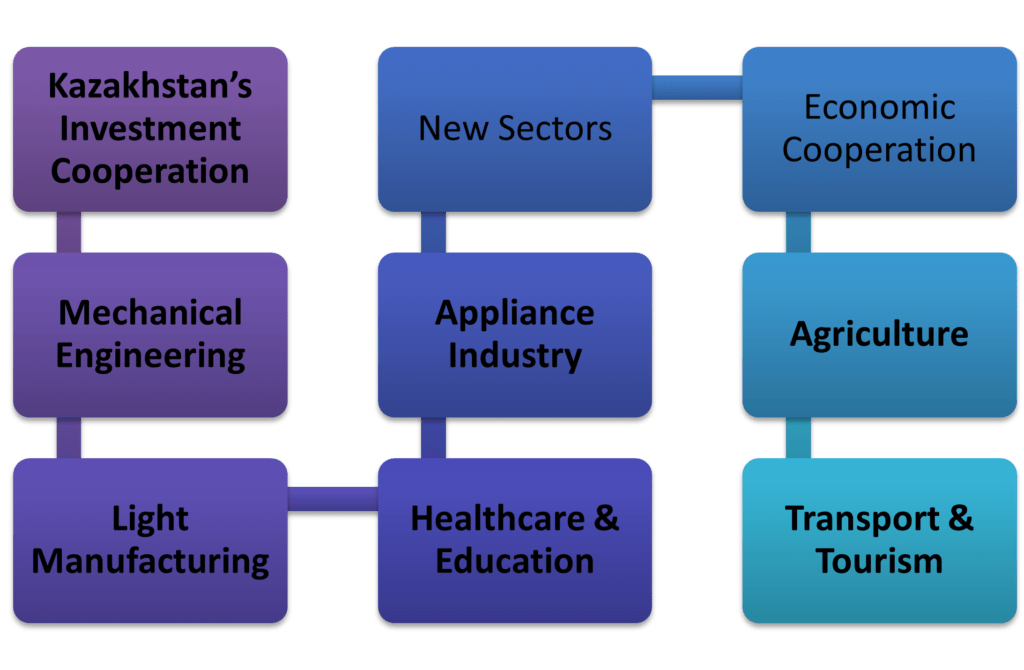
It has certain economic dimensions which are development oriented and dynamic in its composition. It has further increase its constituent priorities, compared to the previous concept, from 9 to 14.
Previously Kazakhstan extended its investment cooperation with foreign partners through listing the economy sectors requiring foreign investment. These are mechanical engineering, appliance industry, agriculture, light manufacturing, healthcare, education, transport, tourism, etc. Thus, the activities of Kazakhstani diplomats are focused on promoting the non-raw-materials sectors of the country’s economy.
Figure-VIII
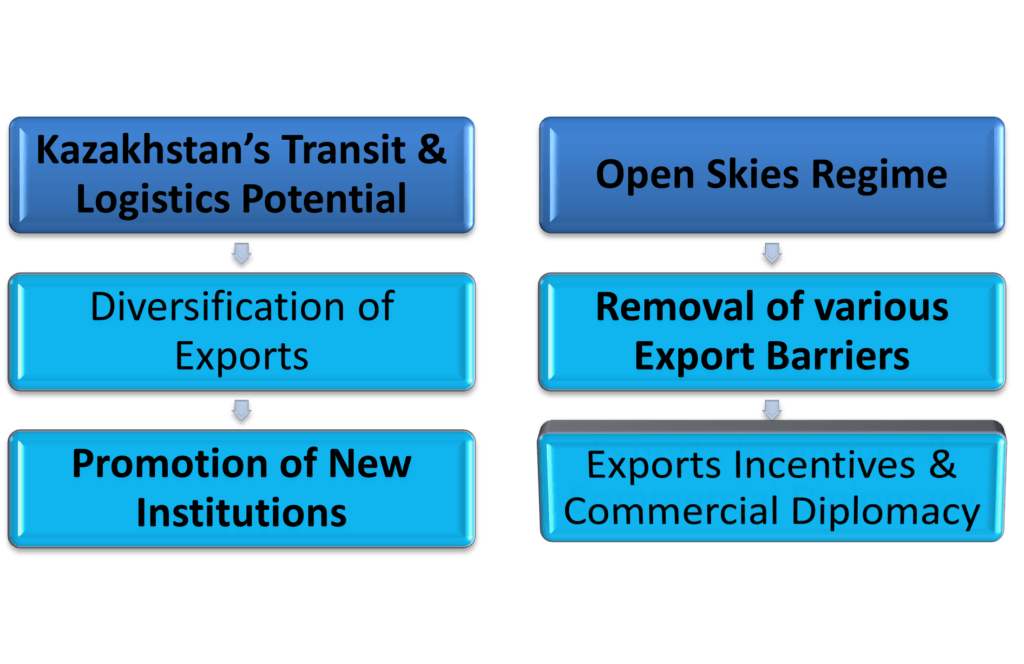
It is designed to promote the development of Kazakhstan’s transit and logistics potential, including the introduction of an “open skies” regime, the expansion of the range, volume and geographical destinations of national exports, dismantling various export barriers in foreign markets, as well as the promotion of institutions like the Astana International Financial Center, The Khorgos International Center for Cross-Border Cooperation and created jointly with Uzbekistan the “Central Asia” Center for Trade and Economic Cooperation.
It indicates a major change in Kazakhstan’s foreign policy priorities. Its perspective applies particularly to the country’s positioning in a regional context. In the previous concept, Kazakhstan presented itself as a country that recognizes its role and responsibility and strives for the development of intra-regional integration in Central Asia, now it openly declares its intentions to consolidate its status as a “leading state in the region which is indeed a paradigm shift in its outlook.
According to new concept relations with other countries in the region have a strategic nature and relations with China, Russia, the United States and the European Union. It supports the expansion of multilateral dialogue and cooperation in Central Asia. Now it appears that Kazakhstan stands ready to help strengthen the existing interaction formats between the Central Asian countries and foreign partners.
Interestingly, Kazakhstan’s foreign policy priorities are now shifted from individual countries to regional and multilateral cooperation. In Asia, for instance, the emphasis is placed both on active participation in the work of the SCO, the Council of Interior Ministers, the OIC, the Cooperation Council of Turkic-speaking states, and on expanding ties with ASEAN, the League of the Arab States and other international organizations, where Kazakhstan is involved.
It fosters enhanced cooperation in the Caspian region in the field of energy, transport, environmental protection and security following adopted in the 2018 Convention on the Legal Status of the Caspian Sea. It also expresses an intention to continue close cooperation with the EAEU member state and to optimize negotiation approaches within the framework of the Union. It supports further strengthening of bilateral relations with Great Britain, which completed its exit from the European Union (Brexit) last year.
Being prominent regional expert of Kazakhstan & CIS I support salient features of new concept of foreign policy. It combines policy formulation with actuality of its implementation thus jump from cosmetic orientations to systematic approach to achieve the goals of further socio-economic prosperity, economic sustainability, continuation of structural reforms, further initiation of political, democratic, social, civil, administrative and judicial reforms under the gambit of pragmatic and progressive foreign policy.
Over the past 30 years Kazakhstan has established diplomatic relations with 186 countries and transformed into one of the dynamically economies of the region and world alike. It successfully nurtured its macro-economy with immaculate vision, policies, programs and integrative mechanism of balanced foreign policy since its inception.
Successive leadership of Kazakhstan followed a holistic foreign policy to make bridges of political consultation, social concession, geopolitical and geostrategic alignment which enabled it to sail through the regional triangle of China, Russia and Turkey to global super orbits of the USA and the EU to protect its vested interest.
Its inbuilt quality of crisis management under the umbrella of foreign policy has averted numerous crises of basic identity, sovereignty, territorial disintegration, economic meltdown, financial crunch, political instability and above all crises of alliance and conveniences. Its participation in the SCO, OIC, the Conference on Interaction and Confidence Building Measures in Asia (CICA), Eurasian Economic Union (EAEU) and Turkic Council has further diversified its foreign policy.
Its superior, supportive and stimulating skills of “Conflict Resolution” have been role model for all the regional as well as international power brokers due to which it lessened escalations and promoted normalizations between the conflicting parties, prime examples may be nuclear negotiations about Iran, Syrian crisis and many others important political and diplomatic rifts in the near past between Turkey and Russia, Iran and the West and last but not least, disorder between Central Asian Countries.
Interestingly its multi-vector foreign policy stimulates people’s friendly policies. Its listening state policy is the outcome of its historic civilization, traditions and norms further enhances and institutionalizes spirits of e-government, accountability, good governance, social responsibility and last but not least political activation in the country.
Its new concept of foreign policy for 2020-2030 has now introduced new ways and means to foster socio-economic prosperity, political stability, democratic norms and social cohesion in the country. It has outlined new codes of glory and gratification. It has new priorities of economic growth, regional connectivity, global engagement and of course persuasion of leading role of Kazakhstan.
Its new concept of foreign policy for 2020-2030 showcases its investment potential and prospects of joint ventures through befitting regional as well as international partnerships.
To conclude the Republic of Kazakhstan has been pursuing its foreign policy on the basis, continuity of the former president policies, striving for building a stable, fair and democratic world order; equal integration into the global political, economic and humanitarian space; effective protection of the rights, freedoms and legitimate interests of Kazakh citizens and compatriots living abroad.
Moreover, Kazakhstan has been trying to promote the external openness of the state, the creation of favourable external conditions for increasing the welfare of Kazakh citizens, the development of the political, economic and spiritual potential of the country.
Kazakhstan’s multi-vector, pragmatic, progressive and proactive foreign policy stands for the development of friendly, equal and mutually beneficial relations with all countries, interstate associations and international organisations of practical interest to Kazakhstan.
Its foreign policy sustains multilateralism to create a collective vision and effective approaches of the international community to solving a wide range of global and regional problems on the basis of multilateral consultations and agreements.
Its foreign policy is the ideal combination of development and security which cares both at the national, regional and global levels. It involves the development of integrated approaches of the international community to respond to cross-border security challenges and threats, conflict resolution, peace building in post-conflict countries.
Kazakhstan’s foreign policy strategy has strategic goals which include strengthening the independence, state sovereignty and territorial integrity of the country, maintaining the independence of its foreign policy. It cultivates consolidation of leading positions and promotion of long-term interests of Kazakhstan in the Central Asian region. It asserts its active and responsible role in the international community, making a significant contribution to ensuring international and regional stability and security.
It secures its friendly, predictable and mutually beneficial relations with foreign states in both bilateral and multilateral formats, the development of integrated cooperation with interstate associations and international organisations.
It supports its foreign policy potential in order to increase the competitiveness of the national economy, the level and quality of life of Kazakh citizens.
It assists in preserving and strengthening the unity of the multiethnic people of Kazakhstan through foreign policy methods and raising the practical interests of citizens of Kazakhstan and national business to the forefront of the state’s foreign policy.
Its new concept of foreign policy 2020-2030 guides the parameters to achieve its strategic goals through increasing efforts to form a politically stable, economically sustainable and secure space around Kazakhstan, continuation of the course on strengthening international peace and cooperation, increasing the effectiveness of global and regional security and interaction systems; the development and implementation of new approaches to key foreign policy issues at the bilateral and multilateral levels, taking into account the promotion and protection of the long-term strategic interests of the state; ensuring a new level of “economisation” of the foreign policy, further strengthening the position of Kazakhstan in the system of the global economic relations; realisation of “humanitarian diplomacy”, popularisation of a positive image of the country in the world community; establishing an effective system of communication with the public of Kazakhstan on foreign policy issues; improvement of work to ensure the protection of personal and family rights of citizens, the legitimate interests of individuals and legal entities of the Republic of Kazakhstan abroad.

